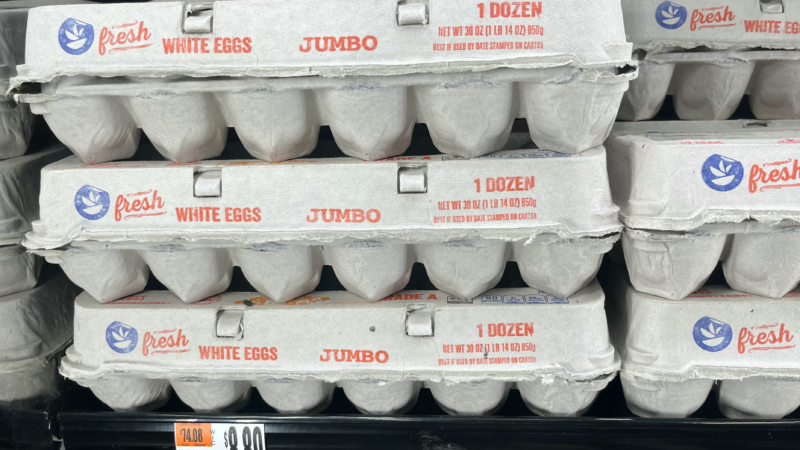Retailers including Trader Joe’s and Kroger have begun limiting egg purchases
Major retailers across the country have begun limiting the number of cartons of eggs shoppers can buy, as prices continue to climb amid a decimated chicken supply.
At Trader Joe’s, customers can only buy one or two dozen a day. The limit is in effect at all locations.
“We hope these limits will help to ensure that as many of our customers who need eggs are able to purchase them when they visit Trader Joe’s,” the company said in a statement.
A spokesperson added, “The rule could be lifted when there are no issues on the supply.”
Kroger said it has not implemented a limit nationally, but some of its divisions have.
“In those divisions, the limits are two dozen per customer, per trip,” a spokesperson said. It did not specify which divisions are enforcing the limits, and has not yet responded to further inquiries by NPR.
What’s going on with the egg supply?
The supply of eggs has been rocked by a bird flu outbreak that has persisted since 2022. Since then, nearly 160 million birds from commercial and backyard flocks have been affected.
The problem has gotten worse in recent months. From November to December, the number of birds infected increased by more than 11 million, and by nearly 5 million from December to January, according to USDA data.
Additionally, the average price of a dozen large, grade A eggs was $4.95 last month, up from $2.52 the year before, according to the Bureau of Labor Statistics.Experts have said it is hard to predict how long it will take for the spread of the disease to be contained.
“I don’t think the stores view it is in their interest for them to have empty shelves. They’d like to have eggs on the shelves when people show up,” said David Anderson, a professor of livestock and food product marketing at Texas A&M University.
The alternative would be to make the prices of eggs even higher to keep them on the shelves, he said.
John Cranfield, interim dean of the University of Guelph’s agricultural college, added that empty shelves could lead customers to shop with competitors.
Cranfield said how long the limits last depends on the farmers’ capacity to supply eggs, which is limited. Farmers have had to euthanize chickens, clean and sanitize barns to get rid of the virus and then bring in a fresh supply of birds, he said.
“That can be anywhere from between two months to four months, depending on the circumstances,” he said.
Why do consumers hoard goods?
It is unclear if retailers have enforced caps because customers have begun hoarding eggs, or if they are limiting purchases to prevent hoarding. Trader Joe’s and Kroger have not yet responded to further inquiries.
Ayelet Fishbach, a professor of behavioral science and marketing at the University of Chicago, said there are a couple of reasons people may hoard consumer goods.
For one, even if a person isn’t anticipating a shortage of a high-demand good, they know that others likely will, so they end up hoarding, which can actually then cause a shortage.
“Hoarding is contagious and not necessarily irrational,” Fishbach said.
Secondly, “people tend to anticipate regretting not having enough food more than they regret having too much,” she said.
Some retailers’ decision to place limits on egg purchases could “likely stoke the hoarder’s fear of going without even more,” said T. Bettina Cornwell, a professor of marketing at University of Oregon.
Anderson said he expects the hoarding behavior to be short-lived due to the perishability of eggs, compared to a longer-term phenomenon such as people hoarding toilet paper during the coronavirus pandemic.
A fire in an Swiss ski resort bar has left about 40 people dead
A New Year's party at a Swiss Alpine bar turned into a tragedy after about 40 people died in a fire and another roughly 115 were injured, many in their teens to mid-20s.
Taiwan’s president pledges to defend island’s sovereignty after Chinese military drills
Taiwanese President Lai Ching-te vowed to defend the self-ruled island's sovereignty in the face of what he termed China's "expansionist ambitions," days after Beijing wrapped up live-fire military drills near its shores.
Deaths reported during widening protests in Iran sparked by ailing economy
The protests began due to economic pressures, with Iran's currency rapidly depreciating. Demonstrators have also chanted against the country's theocracy.
Congress failed to extend Obamacare subsidies. This Democrat says Trump can save them
Sen. Peter Welch, D-Vt., says he thinks the Senate can pass a "retroactive" Affordable Care Act subsidy extension, but "we need President Trump."
Rideshare union rights, social media limits and other state laws taking effect Jan. 1
Every new year, public media reporters across the country bring us some of the new state laws taking effect where they are. Here are six in 2026.
Guides to help you tackle your New Year’s resolutions
From building your strength to tackling credit card debt, NPR's Life Kit has a newsletter journey to help you tackle your New Year's resolution.







